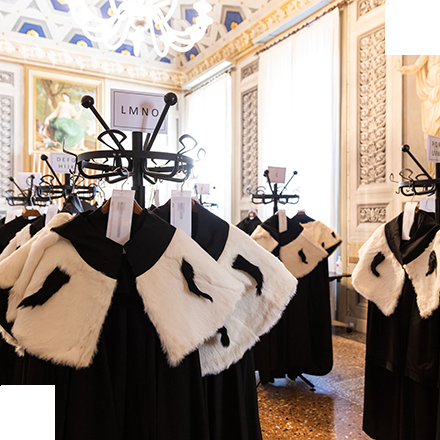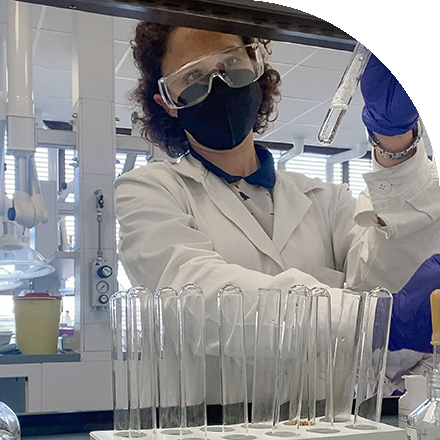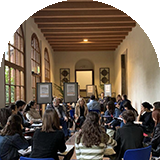Università Cattolica del Sacro Cuore Largo A. Gemelli, 1 - 20123 Milan
Nicolas Bargi
"I wanted to create something different from the usual down jacket, which would also be an alternative of conscience for all those people who, like me, care a lot about eco-sustainability and the health of our planet." Nicolas Bargi, born in Pisa in 1970, proudly claims his invention: an entirely eco-sustainable and cruelty-free down jacket, made with synthetic materials capable of warming even in the harshest climates, without making any use of goose feathers. "Save The Duck" is the name of the company founded by Bargi, which produces the green and animal-friendly down jacket. In 2016 alone, more than two million geese were saved. And that's not the only important fact: Save The Duck is growing at a double-digit rate every year, in 2016 it achieved 27.5 million euros in revenues. For 2017, the target is a turnover of 32.5 million euros. But how did it all start? Bargi himself, who began his studies at the Catholic University of Milan, tells Presenza about this.
Nicolas Bargi, what was your training?
After graduating from high school, I enrolled in the Degree Course in Economics at the Catholic University of Milan, with a focus on Management and Administration. In 1996 I graduated with a written thesis from Columbia University in New York.
But I started working even before that, I really wanted to start. I did all the jobs I could at my father's company, Forest. I worked as a warehouse worker, a sales representative, I took care of the credit management, the commercial part and, finally, the product part, which then became my specialization. Because I am first and foremost a product man, in the sense that I deal above all with the relationship between what I perceive can be sold as a product and the distribution channels and therefore the commercial part. Let's say that over the years this has become my expertise.
How did the "Save The Duck" project get started?
Our company worked mainly on behalf of third parties, only later did we start producing our own lines, such as Bull&Bear, Blackwitch and Ganesh, which began to sell throughout Europe. Then, in 1995, a year before graduating, I opened a studio in China, in Hangzhou, which is still my flagship today. It is a representative office that is responsible for carrying out quality controls and management of collection samples. Then came the most difficult years, those of the crisis, from 2008 to 2011. It was a very difficult period, we wanted to restructure the company, but the banks did not help, in fact they tended to tighten the threads. So we decided to finance ourselves, relaunching the company through the "Save The Duck" project that began, on a practical level, in the winter of 2012. From July 2014 the recovery began, the numbers were important and the growth sustained, but I knew that alone we would not be able to sustain these figures.
So what did he do?
I made an important decision: to liquidate my father's part of the company and bring in Marina Salamon as a partner, who still holds 51% as a financial partner, while I have the remaining 49%, but I am an operating partner.
How did the idea of producing "cruelty free" and eco-sustainable down jackets come about?
It all started with a twofold study: first of all, I observed very carefully the phenomenon of the Igloo down jacket, which was having great success in the Far East. Moreover, after carefully reading the data on consumption at national level, I realized that in the coming years the most requested model on the market would be the micro-down jacket, i.e. the garment that is worn eight months a year. But I didn't want to limit myself to producing the usual goose down garment already abundantly on the market. My idea was to create something different, which was also an alternative of conscience for all those people who, like me, care a lot about eco-sustainability and the health of our planet. A product, in short, that reflected my way of thinking. Among other things, there are many studies that show that the ethical dimension is increasingly orienting the market in all sectors. All the more reason to produce an ethical down jacket.
Technically speaking, what are the advantages of a Save The Duck garment?
Our down jacket, made of synthetic materials, is more performing than traditional models. It is a feature that is especially noticeable in sportswear. Suffice it to say that since the 90s we no longer hike or ski with down clothing.
What materials and procedures do you use to make your product?
The filling of the duvets is made from pet, a petroleum waste material that we treat in two ways: there is the 'virgin' pet that is used as plumtech and the pet that is obtained from the recycling of plastic bottles, so it undergoes two production processes. We are trying to use this second type of material more and more, but it is still an ongoing process that could be completed in two or three years. Another goal is to produce garments using plant-based waste materials, such as bamboo canes, palm trees, and banana peels. After all, this is true sustainable recycling.
How has the consumer response been?
I would say exceptional and this is demonstrated by the fact that we are increasingly conquering very important market shares, obviously at the expense of existing products that I define as obsolete or, better said, vintage. Let me give the example of sport again: in this sector, consumers have become more demanding and want a more functional product. For city leaders we are not yet so far ahead, but there is an increasing attention to the ethical and sustainable dimension, both on the part of companies and buyers.
Save the duck has collaborated with important animal welfare associations such as the WWF. Can you tell me about some projects you've done together?
The partnership with WWF is something that is right in our DNA. Among the most important works was the creation of a line of down jackets to celebrate the 50th anniversary of the Association. We have created 50 garments of 50 different colors, one for each animal at risk of extinction. Through the purchase of the down jacket it was possible to make one's contribution to the protection of the endangered species. It was a very demanding project, 50 stories to tell are a lot, but it gave us a lot of satisfaction, it was worth it. Although we had already embarked on a corporate path in the name of sustainability, I also wanted Save The Duck to receive WWF certification. This is a difficult recognition to obtain, because the association's standards are very strict. We can say that the WWF proposes a real new diligence of the product.
However, I can say that, to my surprise, Save The Duck already met 90% of the parameters.
Last May 3rd was an important day: your company debuted in the "Elite" program of the Italian Stock Exchange as the only freshman in the fashion segment. What did it mean to you?
It was a milestone in helping us achieve our goals. Save The Duck wants to grow, make itself known and become a triple-digit company . To do this, it needs strong partners who can guarantee it more stable growth.
What are Save The Duck's plans for the future?
Focus on the development of e-commerce and retail and combine everything we already produce with the accessory part, then create another product in addition to the jacket.
Save The Duck manufactures in China. Why this choice?
Because China offers an almost unbeatable quality-price ratio. There are realities that we dream of in Europe, companies with an organization that is absolutely up to the level of every industry in the world. This does not mean that the entire production process is done in China, because, for example, the part of the nouveau and inspiration takes place in Italy. However, all the factories we work with in China are certified and there is no risk of exploitation or lack of respect for human rights.
One last question: what memories do you have of the years you spent at Università Cattolica?
They were the best years of my life, years of sacrifices, but the best both in terms of training and humanly. There was a lot of study and there was a great desire to move forward. I am convinced that university years are fundamental for forming a person's personality. To this day, I still keep in touch with several classmates.
Presence, September - December 2017 by Giulia Argenti






